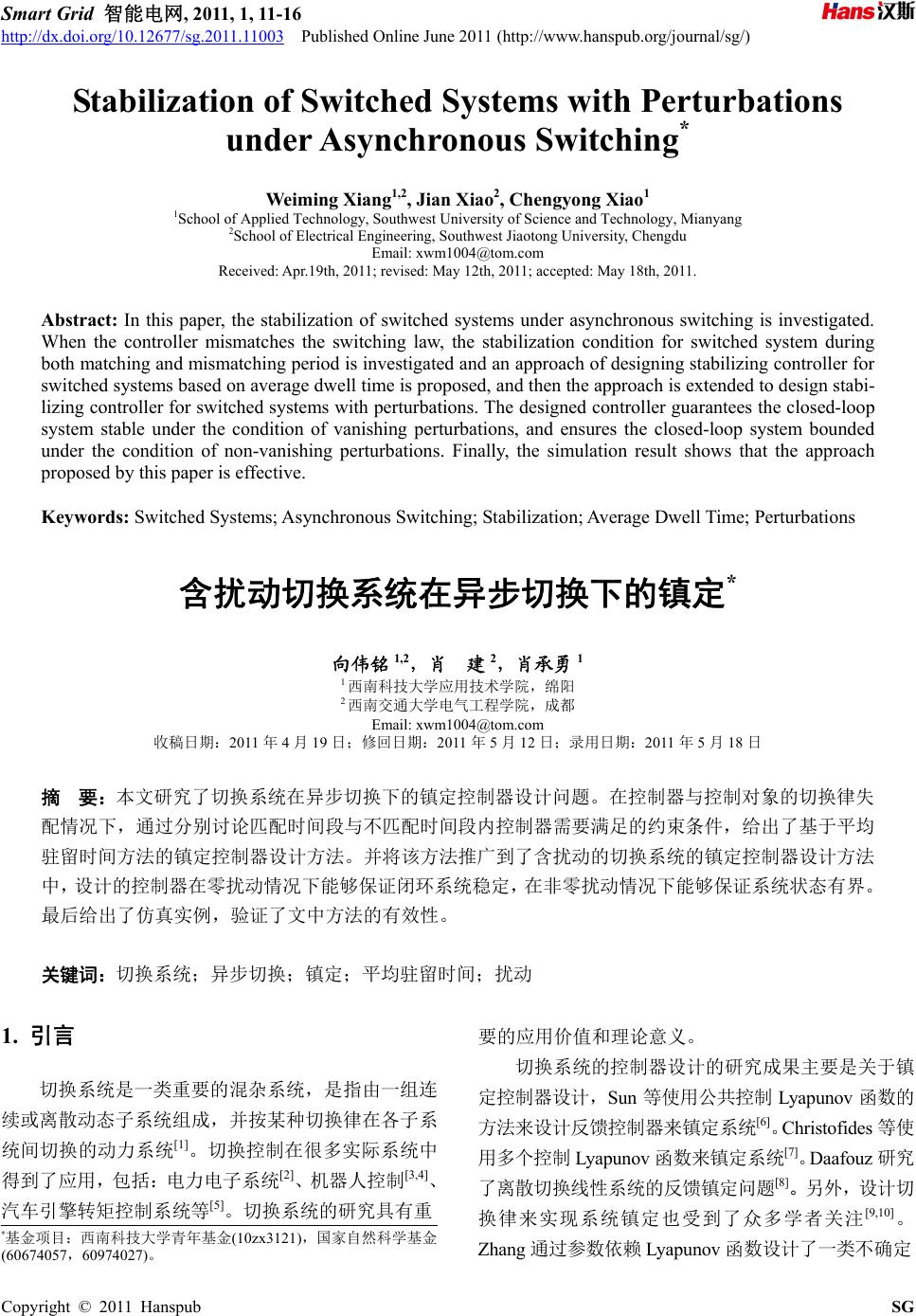 Smart Grid 智能电网, 20 11, 1, 11-16 http://dx.doi.org/10.12677/sg.2011.11003 Published Online June 2011 (http://www.hanspub.org/journal/sg/) Copyright © 2011 Hanspub SG Stabilization of Switched Systems with Perturbations under Asynchronous Switching* We iming Xiang1,2, Jian Xiao2, Chengyong Xiao1 1School of Applied Technology, Southwest University of Science and Technology, Mianyang 2School of Electrical Engineering, Southwest Jiaotong University, Chengdu Email: xwm1004@tom.com Received: Apr.19th, 2011; revised: May 12th, 2011; accepted: May 18th, 2011. Abstract: In this paper, the stabilization of switched systems under asynchronous switching is investigated. When the controller mismatches the switching law, the stabilization condition for switched system during both matching and mismatching p eriod is investigated and an approach of design ing stabilizing controller for switched systems based on average dwell time is proposed, and then the approach is extended to design stabi- lizing controller for switched systems with perturbations. The designed controller guarantees the closed-loop system stable under the condition of vanishing perturbations, and ensures the closed-loop system bounded under the condition of non-vanishing perturbations. Finally, the simulation result shows that the approach proposed by this paper is effective. Keywords: Switched Systems; Asynchronous Switching; Stabilization; A verage Dwell Time; Pertu rbations 含扰动切换系统在异步切换下的镇定* 向伟铭 1,2,肖 建2,肖承勇 1 1西南科技大学应用技术学院,绵阳 2西南交通大学电气工程学院,成都 Email: xwm1004@tom.com 收稿日期:2011 年4月19日;修回日期:2011 年5月12 日;录用日期:2011 年5月18 日 摘 要:本文研究了切换系统在异步切换下的镇定控制器设计问题。在控制器与控制对象的切换律失 配情况下,通过分别讨论匹配时间段与不匹配时间段内控制器需要满足的约束条件,给出了基于平均 驻留时间方法的镇定控制器设计方法。并将该方法推广到了含扰动的切换系统的镇定控制器设计方法 中,设计的控制器在零扰动情况下能够保证闭环系统稳定,在非零扰动情况下能够保证系统状态有界。 最后给出了仿真实例,验证了文中方法的有效性。 关键词:切换系统;异步切换;镇定;平均驻留时间;扰动 1. 引言 切换系统是一类重要的混杂系统,是指由一组连 续或离散动态子系统组成,并按某种切换律在各子系 统间切换的动力系统[1]。切换控制在很多实际系统中 得到了应用,包括:电力电子系统[2]、机器人控制[3,4]、 汽车引擎转矩控制系统等[5]。切换系统的研究具有重 要的应用价值和理论意义。 切换系统的控制器设计的研究成果主要是关于镇 定控制器设计,Sun 等使用公共控制 Lyapunov 函数的 方法来设计反馈控制器来镇定系统[6]。Christofides 等使 用多个控制 Lyapunov 函数来镇定系统[7]。Daafouz研究 了离散切换线性系统的反馈镇定问题[8]。另外,设计切 换律来实现系统镇定也受到了众多学者关注[9,1 0]。 Zhang 通过参数依赖 Lyapunov 函数设计了一类不确定 *基金项目:西南科技大学青年基金(10zx3121),国家自然科学基金 ( 60674057,60974027 ) 。 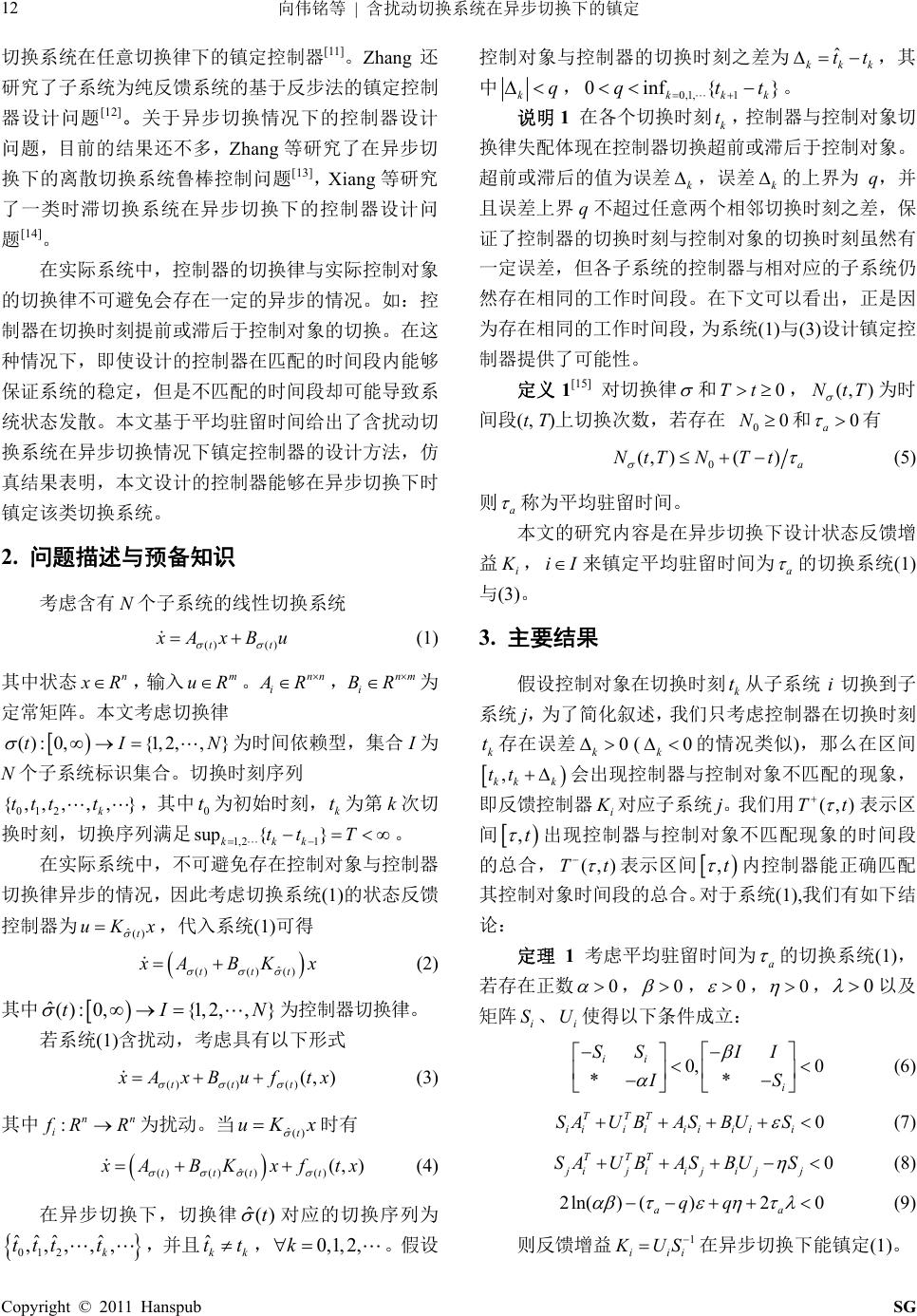 向伟铭等 含扰动切换系统在异步切换下的镇定 12 | t 切换系统在任意切换律下的镇定控制器[11]。Zhang 还 研究了子系统为纯反馈系统的基于反步法的镇定控制 器设计问题[12]。关于异步切换情况下的控制器设计 问题,目前的结果还不多,Zhang 等研究了在异步切 换下的离散切换系统鲁棒控制问题[13],Xiang等研究 了一类时滞切换系统在异步切换下的控制器设计问 题[14]。 在实际系统中,控制器的切换律与实际控制对象 的切换律不可避免会存在一定的异步的情况。如:控 制器在切换时刻提前或滞后于控制对象的切换。在这 种情况下,即使设计的控制器在匹配的时间段内能够 保证系统的稳定,但是不匹配的时间段却可能导致系 统状态发散。本文基于平均驻留时间给出了含扰动切 换系统在异步切换情况下镇定控制器的设计方法,仿 真结果表明,本文设计的控制器能够在异步切换下时 镇定该类切换系统。 2. 问题描述与预备知识 考虑含有 N个子系统的线性切换系统 () ()t x AxBu (1) 其中状态 n x R,输入 。 m uRnn i A R ,nm i BR T 为 定常矩阵。本文考虑切换律 为时间依赖型,集合 I为 N个子系统标识集合。切换时刻序列 ,其中 为初始时刻,为第 k次切 换时刻,切换序列满足 。 ():0, {1,2, 012 {,,,ttt tI , ,} k t , } 0 t 1,2 sup N k t 1 { } kkk tt 在实际系统中,不可避免存在控制对象与控制器 切换律异步的情况,因此考虑切换系统(1)的状态反馈 控制器为 ,代入系统(1)可得 ˆ()t uK x ˆ ()() ()ttt x ABK x (2) 其中 ˆ():0,{1,2,, }tI N 为控制器切换律。 若系统(1)含扰动,考虑具有以下形式 ()() () (, ) ttt x AxBuftx (3) 其中 :n in f RR为扰动。当 时有 ˆ()t uKx ˆ ()()()() (, ) ttt t x ABKxftx (4) 在异步切换下,切换律 ˆ()t 对应的切换序列为 012 ˆˆˆ ˆ ,,, ,, k tttt,并 且,。假设 控制对象与控制器的切换时刻之差为 ,其 中 ˆ t kk t0,1,2,k ˆ kk tt k kq ,0,1, 1 0inf{ kk qt } k t k t k 。 说明 1 在各个切换时刻 ,控制器与控制对象切 换律失配体现在控制器切换超前或滞后于控制对象。 超前或滞后的值为误差 ,误差的上界为q,并 且误差上界 q不超过任意两个相邻切换时刻之差,保 证了控制器的切换时刻与控制对象的切换时刻虽然有 一定误差,但各子系统的控制器与相对应的子系统仍 然存在相同的工作时间段。在下文可以看出,正是因 为存在相同的工作时间段,为系统(1)与(3)设计镇定控 制器提供了可能性。 k 定义 1[15] 对切换律 和, 为时 间段(t, T)上切换次数,若存在 和 0Tt 00N (, )NtT 0 a 有 0 (, )()NtT NTt a (5) 则a 称为平均驻留时间。 本文的研究内容是在异步切换下设计状态反馈增 益i K ,iI 来镇定平均驻留时间为 a 的切换系统(1) 与(3)。 3. 主要结果 假设控制对象在切换时刻从子系统 i切换到子 系统 j,为了简化叙述,我们只考虑控制器在切换时刻 存在误差 k t 0 k k t 0 k ( 的情况类似),那么在区间 , kk k tt 会出现控制器与控制对象不匹配的现象, 即反馈控制器 i K 对应子系统 j。我们用 (,)Tt 表示区 间 ,t 出现控制器与控制对象不匹配现象的时间段 的总合, )(,Tt 表示区间 ,t 内控制器能正确匹配 其控制对象时间段的总合。对于系统(1),我们有如下结 论: 定理 1 考虑平均驻留时间为 a 的切换系统(1), 若存在正数 0 ,0 ,0 ,0 ,0 及 矩阵 i S、i U得以下条件成立: 以 使 0, * * ii i II SS S I 0 0 i S TTT iii iiiii U BASBU (6) SA TTT jijiijij UBAS BU 0 j S (7) SA n()()2 a qq 0 a (8) 2l 1 iii (9) 则反馈增益 K US 在异步切换下能镇定(1)。 Copyright © 2011 Hanspub SG 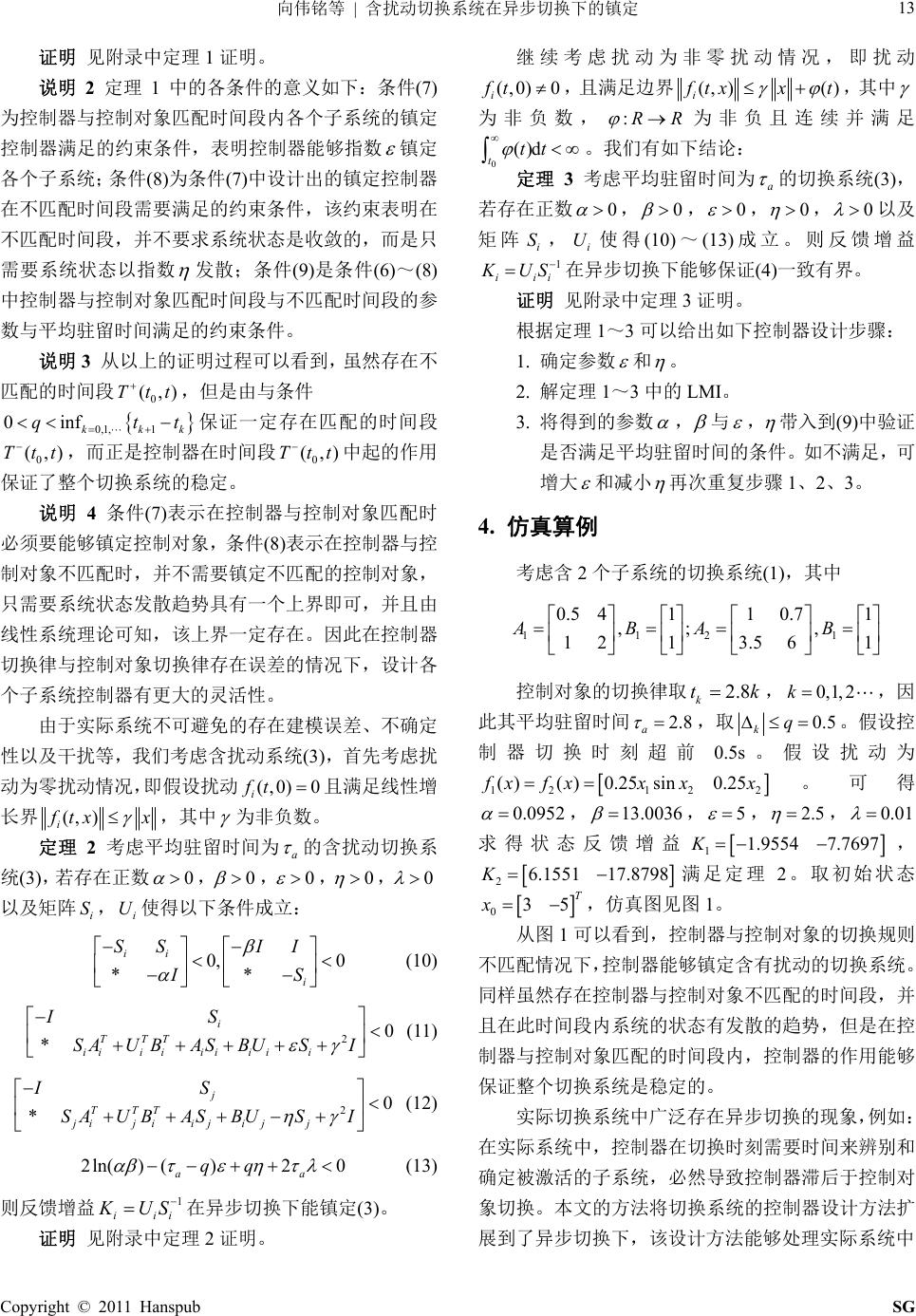 向伟铭等 含扰动切换系统在异步切换下的镇定13 | 证明 见附录中定理 1证明。 说明 2 定理1中的各条件的意义如下:条件(7) 为控制器与控制对象匹配时间段内各个子系统的镇定 控制器满足的约束条件,表明控制器能够指数 镇定 各个子系统;条件(8 )为条件(7)中设计出的镇定控制器 在不匹配时间段需要满足的约束条件,该约束表明在 不匹配时间段,并不要求系统状态是收敛的,而是只 需要系统状态以指数 发散;条件(9)是条件(6)~(8) 中控制器与控制对象匹配时间段与不匹配时间段的参 数与平均驻留时间满足的约束条件。 说明 3 从以上的证明过程可以看到,虽然存在不 匹配的时间段 ,但是由与条件 保证一定存在匹配的时间段 ,而正是控制器在时间段 中起的作用 保证了整个切换系统的稳定。 0 (,)Ttt , 1kk t k t 0,1 0infq 0 (,)Ttt 0 (,)Ttt 说明 4 条件(7) 表示在控制器与控制对象匹配时 必须要能够镇定控制对象,条件(8)表示在控制器与控 制对象不匹配时,并不需要镇定不匹配的控制对象, 只需要系统状态发散趋势具有一个上界即可,并且由 线性系统理论可知,该上界一定存在。因此在控制器 切换律与控制对象切换律存在误差的情况下,设计各 个子系统控制器有更大的灵活性。 由于实际系统不可避免的存在建模误差、不确定 性以及干扰等,我们考虑含扰动系统(3),首先考虑扰 动为零扰动情况,即假设扰动 且满足线性增 长界 (,0) 0 i ft (, ) i f tx x ,其中 为非负数。 定理 2 考虑平均驻留时间为 a 的含扰动切换系 统(3),若存在正数 0 ,0 ,0 ,0 ,0 以及矩阵 ,使得以下条件成立: i Si U 0, 0 * * ii i II SS S I (10) 20 * i TTT iiiiiii ii IS SAU BASBUSI (11) 20 * j TTT jij iiji jj IS SA UBASBUSI a (12) 2ln() ()20 a qq (13) 则反馈增益 在异步切换下能镇定(3)。 1 iii KUS 证明 见附录中定理 2证明。 继续考虑扰动为非零扰动情况,即扰动 (,0) 0 i ft ,且满足边界(, )() i f txx t ,其 中 为非负数, :RR 为非负且连续并满足 0()d ttt 。我们有如下结论: 定理 3 考虑平均驻留时间为a 的切换系统(3), 若存在正数 0 ,0 ,0 ,0 ,0 以及 矩阵 ,使得(10)~(13)成立。则反馈增益 i Si U 1 iii K US 在异步切换下能够保证(4)一致有界。 证明 见附录中定理 3证明。 根据定理 1~3可以给出如下控制器设计步骤: 1. 确定参数 和 。 2. 解定理1~3中的LMI。 3. 将得到的参数 , 与 , 带入到(9)中验证 是否满足平均驻留时间的条件。如不满足,可 增大 和减小 再次重复步骤 1、2、3。 4. 仿真算例 考虑含 2个子系统的切换系统(1),其中 112 1 0.5 4110.71 ,; , 12 13.561 ABA B 控制对象的切换律取 ,,因 此其平均驻留时间 2.8 k tk0, 1,2k 2.8 a ,取 0.5q k 。假设控 制器切换时刻超前 0.5s 。假设扰动为 12 2 ( )()0.0 1 25 sin2 .25 f xfx 0.0952 x xx。可得 ,13.0036 ,5 ,2.5 ,0.01 求得状态反馈增益 11.9 554 7.7697K, 26.1551 17K 035 T x .8798 满足定理 2。取初始状态 ,仿真图见图 1。 从图 1可以看到,控制器与控制对象的切换规则 不匹配情况下,控制器能够镇定含有扰动的切换系统。 同样虽然存在控制器与控制对象不匹配的时间段,并 且在此时间段内系统的状态有发散的趋势,但是在控 制器与控制对象匹配的时间段内,控制器的作用能够 保证整个切换系统是稳定的。 实际切换系统中广泛存在异步切换的现象,例如: 在实际系统中,控制器在切换时刻需要时间来辨别和 确定被激活的子系统,必然导致控制器滞后于控制对 象切换。本文的方法将切换系统的控制器设计方法扩 展到了异步切换下,该设计方法能够处理实际系统中 Copyright © 2011 Hanspub SG 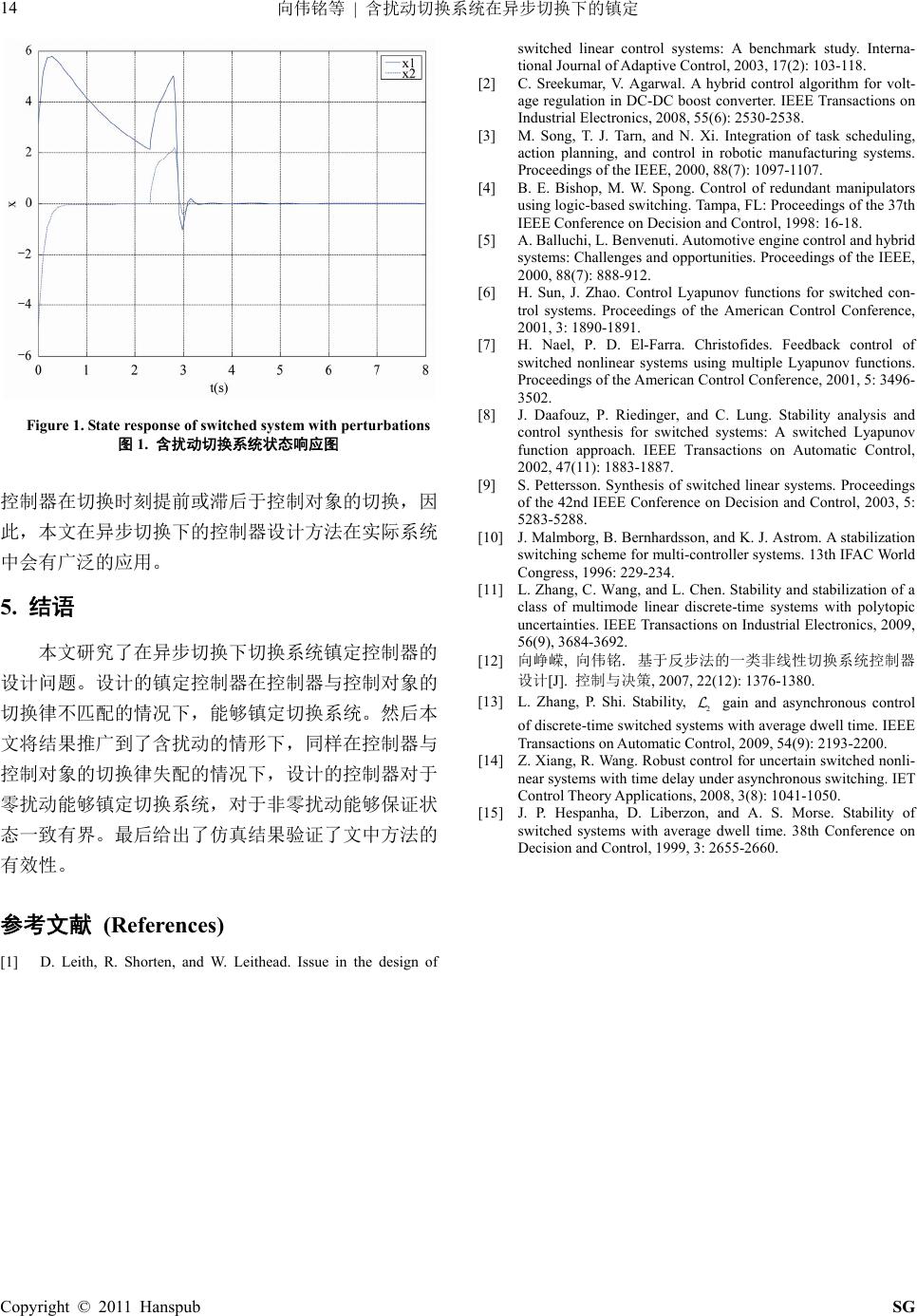 向伟铭等 | 含扰动切换系统在异步切换下的镇定 Copyright © 2011 Hanspub SG 14 Figure 1. State response of switched system with perturbations 图1. 含扰动切换系统状态响应图 控制器在切换时刻提前或滞后于控制对象的切换,因 此,本文在异步切换下的控制器设计方法在实际系统 中会有广泛的应用。 5. 结语 本文研究了在异步切换下切换系统镇定控制器的 设计问题。设计的镇定控制器在控制器与控制对象的 切换律不匹配的情况下,能够镇定切换系统。然后本 文将结果推广到了含扰动的情形下,同样在控制器与 控制对象的切换律失配的情况下,设计的控制器对于 零扰动能够镇定切换系统,对于非零扰动能够保证状 态一致有界。最后给出了仿真结果验证了文中方法的 有效性。 参考文献 (References) [1] D. Leith, R. Shorten, and W. Leithead. Issue in the design of switched linear control systems: A benchmark study. Interna- tional Journal of Adaptive Control, 2003, 17(2): 103-118. [2] C. Sreekumar, V. Agarwal. A hybrid control algorithm for volt- age regulation in DC-DC boost converter. IEEE Transactions on Industrial Electronics, 2008, 55(6): 2530-2538. [3] M. Song, T. J. Tarn, and N. Xi. Integration of task scheduling, action planning, and control in robotic manufacturing systems. Proceedings of the IEEE, 2000, 88(7): 1097-1107. [4] B. E. Bishop, M. W. Spong. Control of redundant manipulators using logic-based switching. Tampa, FL: Proceedings of the 37th IEEE Conference on Decision and Control, 1998: 16-18. [5] A. Balluchi, L. Benvenuti. Automotive engine control and hybrid systems: Challenges and opportunities. Proceedings of the IEEE, 2000, 88(7): 888-912. [6] H. Sun, J. Zhao. Control Lyapunov functions for switched con- trol systems. Proceedings of the American Control Conference, 2001, 3: 1890-1891. [7] H. Nael, P. D. El-Farra. Christofides. Feedback control of switched nonlinear systems using multiple Lyapunov functions. Proceedings of the American Control Conference, 2001, 5: 3496- 3502. [8] J. Daafouz, P. Riedinger, and C. Lung. Stability analysis and control synthesis for switched systems: A switched Lyapunov function approach. IEEE Transactions on Automatic Control, 2002, 47(11): 1883-1887. [9] S. Pettersson. Synthesis of switched linear systems. Proceedings of the 42nd IEEE Conference on Decision and Control, 2003, 5: 5283-5288. [10] J. Malmborg, B. Bernhardsson, and K. J. Astrom. A stabilization switching scheme for multi-controller systems. 13th IFAC World Congress, 1996: 229-234. [11] L. Zhang, C. Wang, and L. Chen. Stability and stabilization of a class of multimode linear discrete-time systems with polytopic uncertainties. IEEE Transactions on Industrial Electronics, 2009, 56(9), 3684-3692. [12] 向峥嵘, 向伟铭. 基于反步法的一类非线性切换系统控制器 设计[J]. 控制与决策, 2007, 22(12): 1376-1380. [13] L. Zhang, P. Shi. Stability, 2 gain and asynchronous control of discrete-time switched systems with average dwell time. IEEE Transactions on Automatic Control, 2009, 54(9): 2193-2200. [14] Z. Xiang, R. Wang. Robust control for uncertain switched nonli- near systems with time delay under asynchronous switching. IET Control Theory Applications, 2008, 3(8): 1041-1050. [15] J. P. Hespanha, D. Liberzon, and A. S. Morse. Stability of switched systems with average dwell time. 38th Conference on Decision and Control, 1999, 3: 2655-2660. 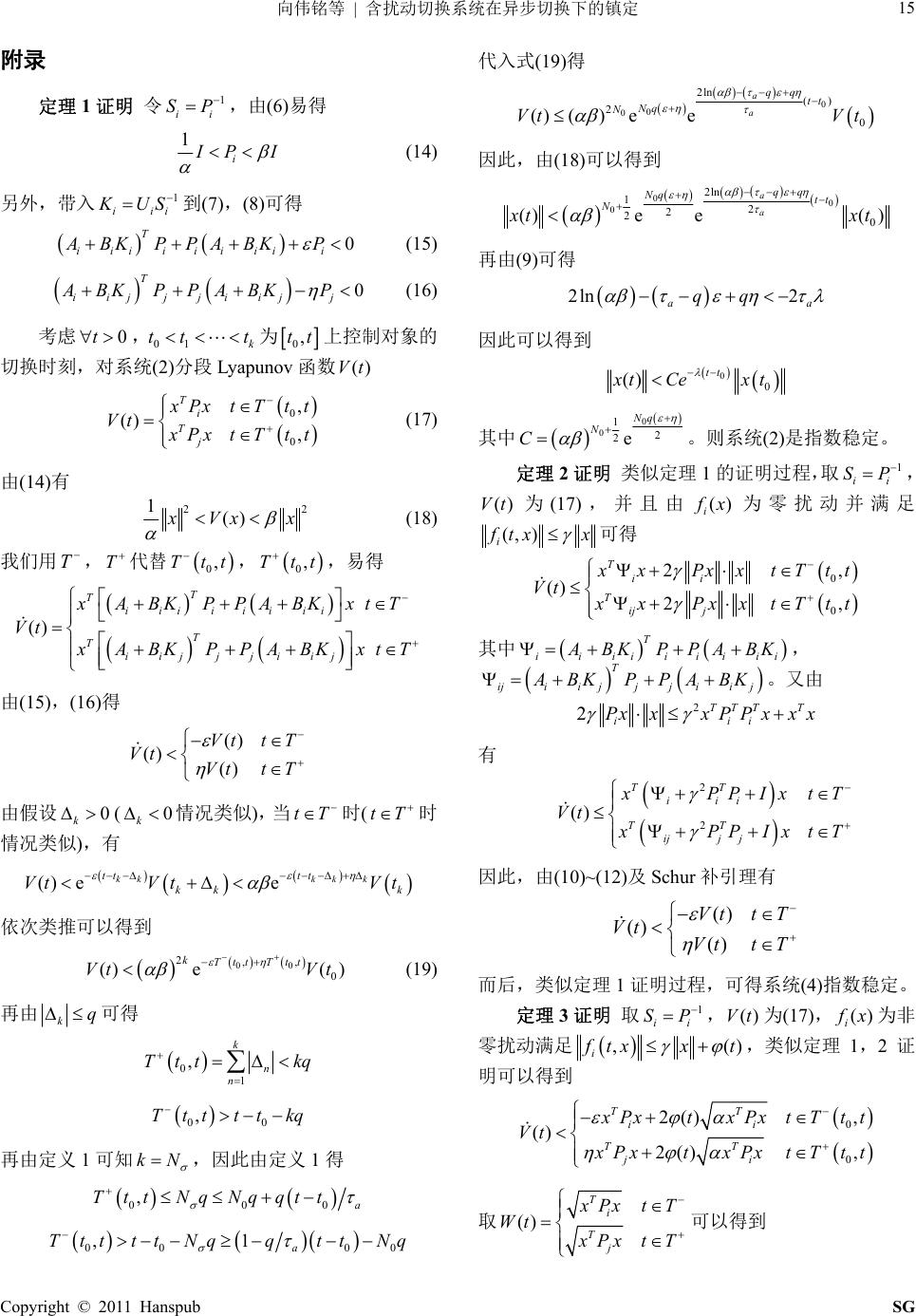 向伟铭等 含扰动切换系统在异步切换下的镇定15 | 附录 定理 1证明 令,由(6)易得 1 ii SP 1i I PI (14) 另外,带入 1 iii K US 到(7),(8)可得 0 T iiiiiiii i ABK PPABKP (15) 0 T iijjjiijj ABK PPABKP (16) 考虑 ,为0t01k tt t 0,tt上控制对象的 切换时刻,对系统(2)分段 Lyapunov 函数 ()Vt 0 0 , () , Ti Tj x PxtTt t Vt x PxtTt t (17) 由(14)有 2 1() 2 x Vx x (18) 我们用T,T代替 , ,易得 0,Ttt 0,Ttt () T Tiiiiiiii T Tiijjjiij x ABK PPABK xtT Vt x ABKPPABK xtT 由(15),(16)得 () () () Vtt T Vt Vtt T 由假设 (情况类似),当 t时(t0 k 0 k T T 时 情况类似),有 () ee kkkk k tt tt kk k Vt VtVt 依次类推可以得到 00 2,, 0 ()e( ) kTtt Ttt Vt Vt (19) 再由 kq可得 01 ,k n n Ttt kq 00 ,Ttttt kq 再由定义 1可知 kN ,因此由定义 1得 00 ,a Ttt NqNqqtt 0 00 0 ,1 a Ttttt NqqttNq 代入式(19)得 0 0 0 2ln () 20 () ()ee a a qq tt Nq N Vt Vt 因此,由(18)可以得到 00 0 2ln 12 2 20 ()ee( ) a a qq Nq tt N x tx t 再由(9)可得 2ln2 aa qq 因此可以得到 00 () tt x tCext 其中 0 012 2e Nq N C 。则系统(2)是指数稳定。 定理 2证明 类似定理 1的证明过程,取1 ii SP , 为(17) ,并且由 ()Vt () i f x为零扰动并满足 (, ) i f tx x 可得 0 0 2, () 2, Tii Tij j x xPxxtTt Vt t x xPxxtTt t 其中 T iiiiiiiii A BKPP ABK , T ii jjjii jij A BKPP ABK。又由 2TTT 2T iii 0 P xx xPPxxx 有 2 2 () TT iii TT ijj j x PPI xtT Vt x PPIxt T 因此,由(10)~(12)及Schur 补引理有 () () () Vtt T Vt Vtt T 而后,类似定理 1证明过程,可得系统(4)指数稳定。 定理 3证明 取, 为(17), 1 ii SP ()Vt () i f x为非 零扰动满足 , f () itxxt ,类似定理 1,2证 明可以得到 0 0 2() , () 2() , TT ii TT ji x Pxtx PxtTtt Vt x Pxtx PxtTtt 取() Ti Tj x PxtT Wt x Pxt T 可以得到 Copyright © 2011 Hanspub SG 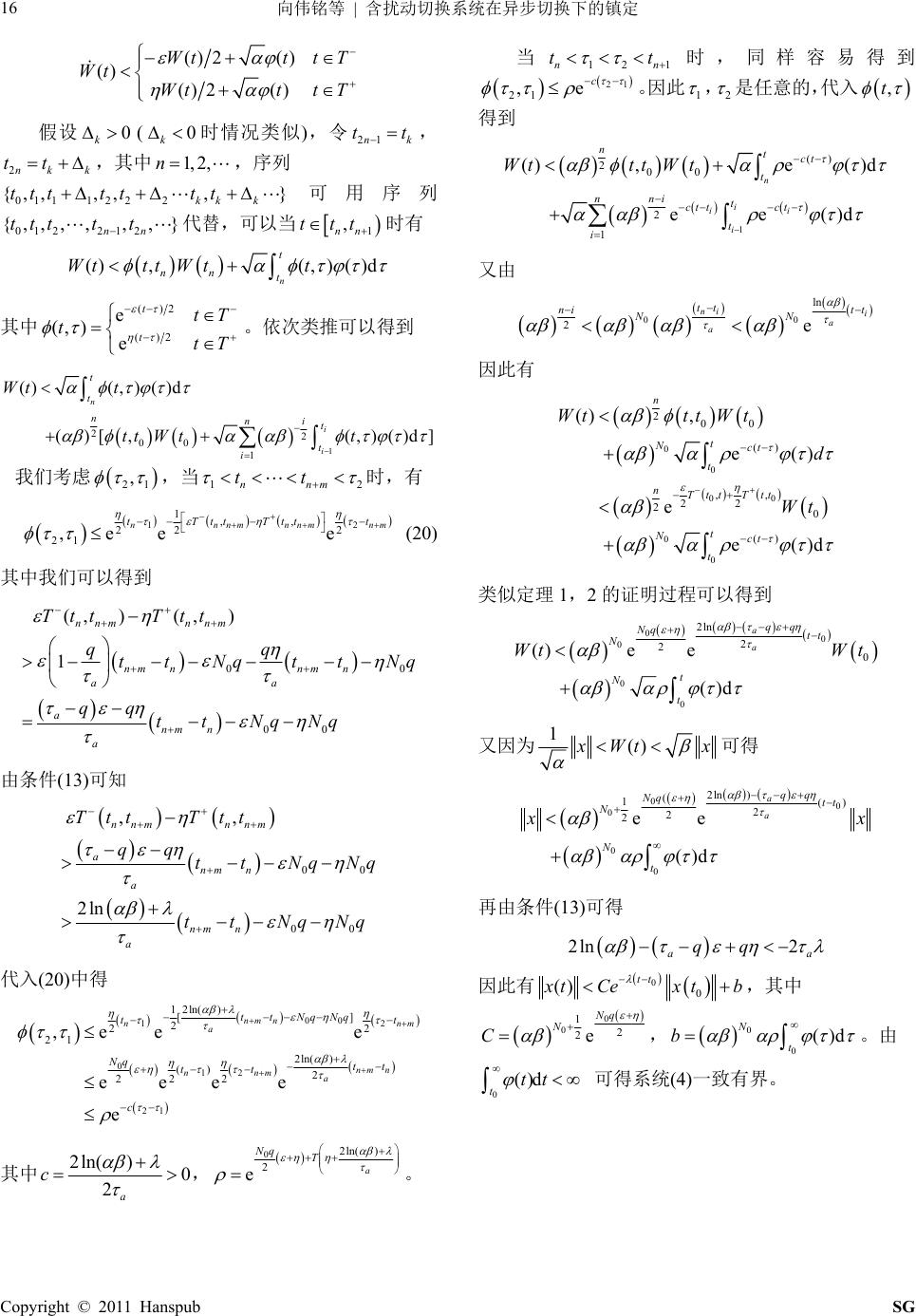 向伟铭等 含扰动切换系统在异步切换下的镇定 16 | ()2 () () ()2 () Wttt T Wt Wttt T 假设 (时情况类似),令0 k 0 k 21nk tt , ,其中 ,序列 可用序列 代替,可以当 tt时有 2nk tt 011 {,,ttt 012 {,,,ttt k 122 , ,tt 21 , , nn t t 1, 2n 2t 2 , } , , kk t} k 1 , nn t (),(,)( )d n t nn t Wttt Wtt 其中 ()2 ()2 e (, )e t t tT ttT 。依次类推可以得到 1 22 00 1 ()(,)( )d ()[, (,)()d] n i i t t nnit t i Wt t ttW tt 我们考虑 21 , ,当 12nnm tt 时,有 12 1,, 22 2 21 ,ee e nnnmnnm tTttTttt nm (20) 其中我们可以得到 00 00 (,)(,) 1 nnm nnm nm nnm n aa anm n a TttTtt qq ttNqtt N qq ttNq Nq q 由条件(13)可知 00 00 ,, 2ln nnm nnm anmn a nm n a Ttt Ttt qq ttNq Nq ttNq Nq 代入(20)中得 00 12 012 21 12ln( ) [] 2 22 21 2ln( ) () 2 222 ,e ee eee e e nm n nnm a nmn nnm a ttNq Nq tt Nq tt tt c 其中 2ln( )0 2a c , 02ln( ) 2 ea Nq T 。 当12n t1n t 21 ,e c 时,同样容易得到 21 。因此 1 ,2 是任意的,代入 ,t 得到 1 () 200 2 1 (),e()d ee()d n i ii i ntct t nni t ct tct t i Wttt Wt 又由 00 ln 2e ni i a a tt ni tt NN 因此有 0 0 00 0 0 200 () ,, 22 20 () () , e() e e() n t Nct t nTtt Ttt t Nct t Wttt Wt d Wt d 类似定理 1,2的证明过程可以得到 00 0 0 0 2ln 2 20 ()e e ()d a a qq Nq tt N t N t Wt Wt 又因为 1() x Wt x 可得 00 0 0 0 2ln) ( 1() 2 2 2ee ()d a a qq Nq tt N N t x x 再由条件(13)可得 2ln2 aa qq 因此有 00 () tt x tCe xt b ,其中 0 012 2e Nq N C , 0 0()d N t b 。由 0()d ttt 可得系统(4)一致有界。 Copyright © 2011 Hanspub SG |